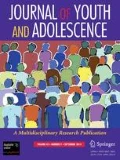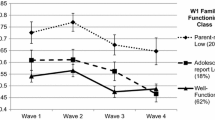Abstract
The relationship between economic hardship and adolescent aggression has been explored from various perspectives. Using survey and observational data on two-parent families in a midwestern rural county, the study identifies four important mechanisms that link economic hardship to the aggressive behavior of adolescents. Economic pressure stemming from low income, financial loss, and unstable work, adversely affects the marital relationship through the negativity of fathers. Negative marital interactions increase irritable parenting, making adolescent aggression more likely.
Similar content being viewed by others
References
Bakeman, R., and Adamson, L. B. (1984). Coordinating attention to people and objects in mother-infant and peer-infant interactions.Child Develop. 55: 1278–1289.
Bane, M. J., and Elwood, D. T. (1986). Slipping into and out of poverty: The dynamics of spells.J. Human Resources 21: 1–23.
Baumrind, D. (1971). Current patterns of paternal authority.Develop. Psychol. Monog. 4(1): part 2.
Belsky, J., and Pensky, E. (1988). Developmental history, personality, and family relationships: Toward an emergent family system. In Hinde, R., and Stevenson, J. (eds.),Relationships Within Families: Mutual Influences. Clarendon, Oxford.
Bolger, N., Delangis, A., Kessler, R., and Wethington, E. (1989). Effects of daily stress on negative mood.J. Personality and Social Psychol. 57: 808–818.
Bronfenbrenner, U., and Crouter, A. C. (1983). The evolution of environmental models in developmental research. In Mussen, P. (ed.),Handbook of Child Psychology: History, Theory, and Methods (Vol. 1). Wiley, New York.
Bultena, G., Lasley, P., and Geller, J. (1986). The farm crisis: Patterns and impacts of financial stress among Iowa farm families.Rural Sociol. 51: 436–448.
Buss, A. H., and Durkee, A. (1957). An inventory for assessing different kinds of hostility.J. Consult. Psychol. 21: 343–349.
Conger, R. D., Elder, G. H., Lorenz, F. O., Conger, K. J., Simons, R. L., Whitbeck, L. B., Huck, S., and Melby, J. N. (1990). Linking economic hardship to marital quality and instability.J. Marriage Family 52: 643–656.
Christensen, A., and Margolin, G. (1988). Conflict and alliance in distressed and non-distressed families. In Hinde, R., and Stevenson, J. (eds.),Relationships Within Families: Mutual Influences. Clarendon, Oxford.
Dooley, D., and Catalano, R. (1988). Psychological effects of unemployment.J. Social Issues 44: 1–191.
Duncan, G. J. (1984).Years of Poverty, Years of Plenty. Institute for Social Research, Ann Arbor, MI.
Elder, G. H., Jr. (1974).Children of the Great Depression. University of Chicago Press, Chicago.
Elder, G. J., Jr. (1979). Historical change in life patterns and personality. In Baltes, P. B., and Brim, O. G. (eds.),Life-Span Development and Behavior (Vol. 2). Academic Press, New York.
Elder, G. H., Jr., Foster, E. M., and Conger, R. D. (1990). Families under economic pressure. Social Change Project, Carolina Population Center, 300A University Square, Chapel Hill, NC 27514.
Elder, G. H., Jr., and Caspi, A. (1988). Economic stress in lives: Developmental perspectives.J. Social Issues 44: 25–45.
Elder, G. H., Jr., Liker, J. K., and Cross, C. E. (1984). Parent-child behavior in the Great Depression: Life course and intergenerational influences.Life Span Develop. Behav. 6: 109–158.
Forgatch, M. S., Patterson, G. R., and Skinner, M. L. (1988). A mediational model for the effect of divorce on antisocial behavior in boys. In Heterington, E. M., and Aresteh, J. D. (eds.),Impact of Divorce, Single parenting, and Step-Parenting on Children. Erlbaum, Hillsdale, NJ.
Gottman, J. M., and Levenson, R. W. (1996). Assessing the role of emotion in marriage.Behav. Assess. 8: 31–48.
Hetherington, E. M., and Clingempeel, G. (1986). Global coding manual. Department of Psychology, University of Virginia, Charlottesville.
Lempers, J. D., Clark-Lempers, D., and Simons, R. L. (1989). Economic hardship, parenting, and distress.Child Develop. 60: 25–39.
Liker, J. K., and Elder, G. H., Jr. (1983). Economic hardship and marital relations in the 1930s.Am. Social. Rev. 48: 343–359.
Mayer, S. E., and Jencks, C. (1988). Poverty and the distribution of material hardship.J. Human Resources 24: 88–114.
McLoyd, V. C. (1989). Socialization and development in a changing economy: The effects of paternal job and income loss on children.Am. Psychol. 44: 292–302.
Modell, J. (1978). Patterns of consumption, acculturation, and family income strategy in late 19th century America. In Hareven, T. K., and Vinovskis, M. (eds.),Family and Population in Nineteenth Century America. Princeton University Press, Princeton, NJ.
Montemayor, R. G., Adams, G. R., and Gullotta, T. P. (1990). (eds).From Childhood to Adolescence: A Transition Period? Sage, Newbury Park, CA.
Patterson, G. R. (1982).Coercive Family Process. Castallia, Eugene, OR.
Patterson, J. T. (1981).America's Struggle Against Poverty, 1900–1980. Harvard University Press, Cambridge, MA.
Patterson, G. R., Capaldi, D., and Bank, L. (1991). Two paths to delinquency: The early- and late-starters models. In Pepler, D. and Rubin, K. B., (eds.),The Development and Treatment of Childhood Aggression. Lawrence Erlbaum, Hillsdale, NJ.
Quay, H. C., and Peterson, D. R. (1983).Interim Manual for the Revised Behavior Problem Checklist. University of Miami, Miami, FL.
Rathge, R. W., Leistritz, F. L., and Goreham, G. A. (1988). Farmers displaced in economically depressed times.Rural Social. 53: 346–356.
Simmons, R. G., and Blyth, D. A. (1987).Moving into Adolescence. Aldine De Gruyer, New York.
Snyder, J., and Patterson, G. R. (1986). The effects of consequences on patterns of social interaction: A quasi-experimental approach to reinforcement in natural interaction.Child Develop. 57: 1257–1268.
Tanaka, J. (1987). “How big is big enough?”: Sample size and goodness of fit in structural equation models with latent variable.Child Develop. 58: 134–146.
Townsend, P. (1979).Poverty in the United Kingdom: A Survey of Household Resources and Standards of Living. University of California Press, Los Angeles.
Velicer, W. F., Govia, J. M., Cherico, N. P., and Corriveau, D. P. (1985). Item format and the structure of the Buss-Durkee Hostility Inventory.Aggressive Behav. 11: 65–82.
Warr, P. (1987).Work, Unemployment, and Mental Health.Oxford University Press, Oxford, England.
Zimmerman, C. C. (1936).Consumption and Standards of Living. Van Nostrand, New York.
Author information
Authors and Affiliations
Additional information
This paper is based on collaborative research involving the Iowa Youth and Families Project at Iowa State University, Ames, and the Social Change Project at University of North Carolina — Chapel Hill. The combined research effort is currently supported by the National Institute of Mental Health (MH43270), the National Institute on Drug Abuse (DA05347), the John D. and Catherine T. MacArthur Foundation Program for Successful Adolescence, the Bureau of Maternal and Child Health (MCJ-109572), and a Research Scientist Award (MH00567).
Ph.D. in sociology from University of North Carolina at Chapel Hill. Research focuses on the experience of adolescents in the changing rural economy.
Ph.D. in sociology from University of North Carolina — Chapel Hill. Research focuses on life course development, particularly the short- and long-term consequences of economic hardship and military service on individual lives.
Ph.D. in sociology from the University of Washington. Research focuses on family relationships in the context of social change.
Rights and permissions
About this article
Cite this article
Skinner, M.L., Elder, G.H. & Conger, R.D. Linking economic hardship to adolescent aggression. J Youth Adolescence 21, 259–276 (1992). https://doi.org/10.1007/BF01537018
Received:
Accepted:
Issue Date:
DOI: https://doi.org/10.1007/BF01537018




